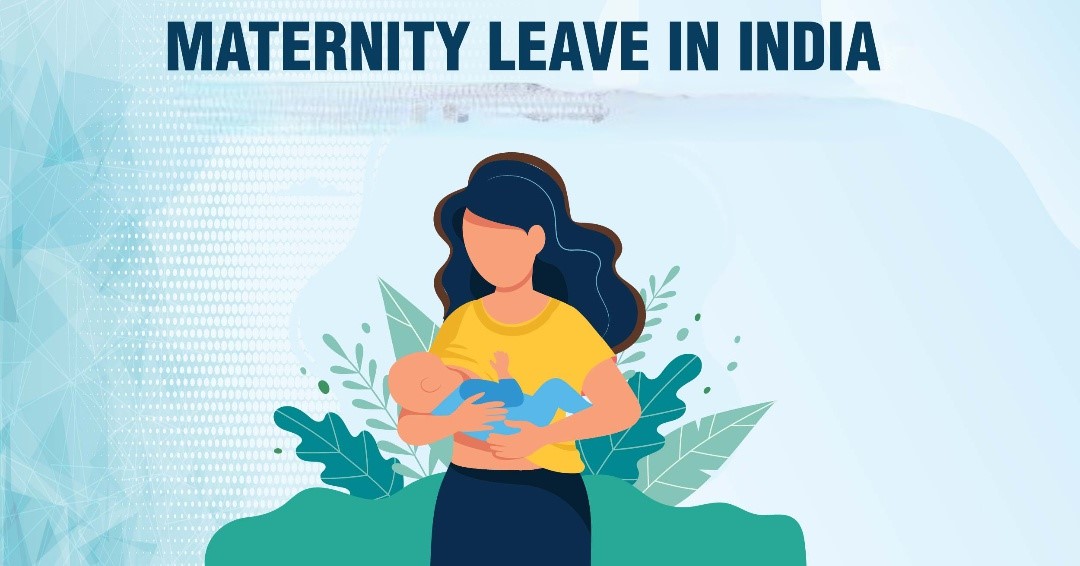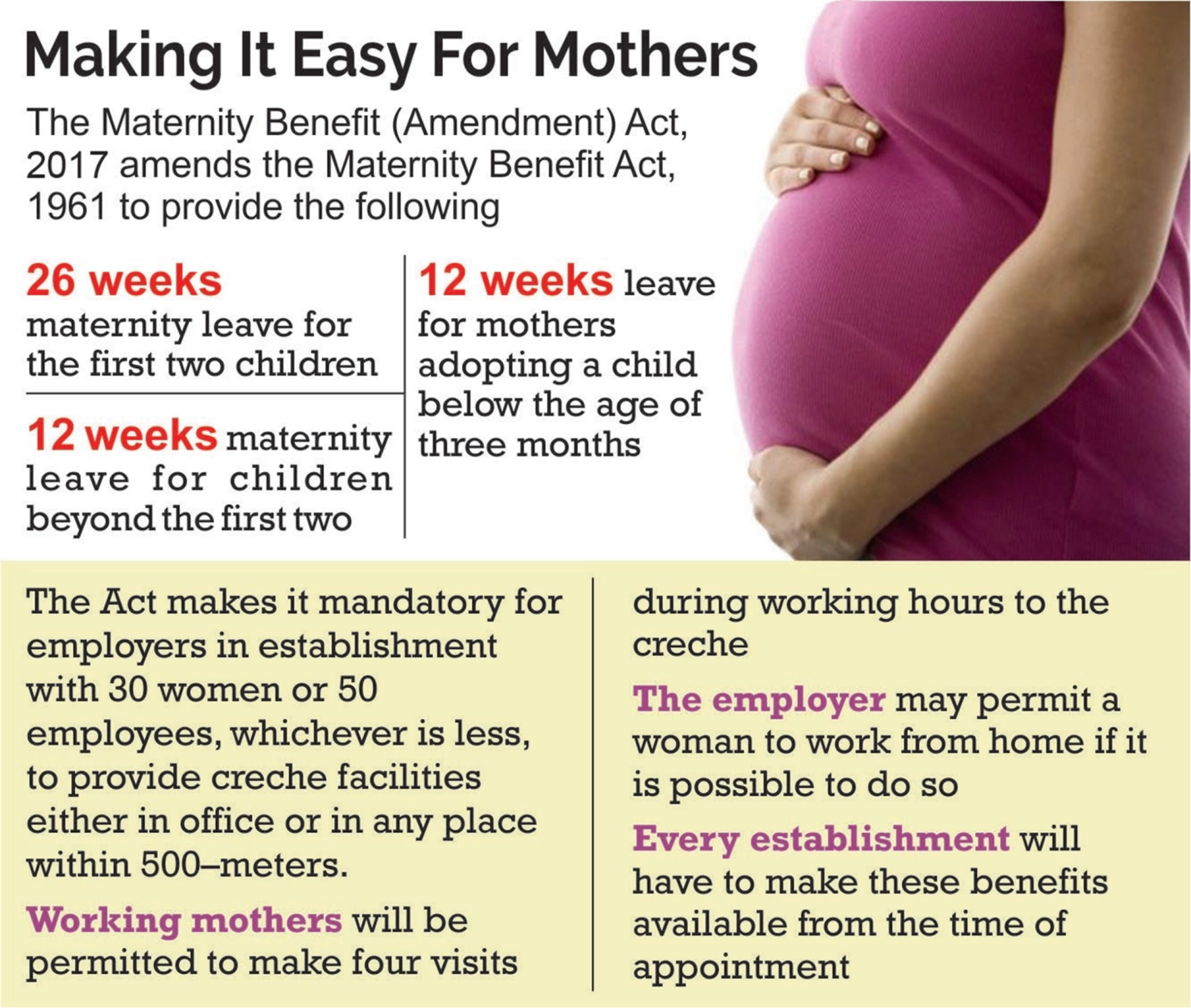
Copyright infringement not intended
Context: The Supreme Court decided to consider an appeal questioning the constitutionality of Section 5(4) of the Maternity Benefit Act of 1961.
Details
- A Supreme Court panel headed by the Chief Justice of India decided to consider the Public Interest Litigation (PIL), which challenges Section 5(4) of the Maternity Benefit Act, 1961 because it is "arbitrary" and "discriminatory" towards adoptive mothers and orphaned children.
Background
- The Maternity Benefit Act was amended in 2017 to include specific provisions for women who adopt, which were not included in the original 1961 Act.
- According to Section 5(4) of the 2017 amended Act, "a woman who legally adopts a child under the age of three months or a commissioning mother shall be entitled to maternity benefit for a period of twelve weeks from the date the child is handed over to the adopting mother or the commissioning mother, as the case may be."
- A "commissioning mother" is a surrogate mother who is defined as "a biological mother who uses her egg to create an embryo implanted in any other woman."
- A woman who adopts a child who is older than three months receives no benefits. The PIL argues that this provision is "discriminatory" and "arbitrary" towards adoptive mothers.

Maternity Benefit Act, 1961
About
- The Maternity Benefit Act was first passed by Parliament in 1961 to regulate women's employment in "certain establishments" during and after childbirth, as well as "to provide for maternity benefits and certain other benefits."
- It replaced the Mines Maternity Benefit Act of 1941 and the Maternity Benefit Act of 1929.
- Only Applicable to organised sector women workers.
Applicable
- Initially, it applied to any facility "being a factory, mine, or plantation," but it was later expanded in 1973 to include "any such establishment belonging to the government" and "any establishment where persons are employed to exhibit of sporting, acrobatic, and other performances."
Section 4 of the Act
- Section 4 of the 1961 Act prohibited the employment or work of women during a specific period, stating that "no employer shall knowingly employ a woman in any establishment during the six weeks immediately following the day of her delivery or miscarriage."
Section 5 of the Act
- Section 5 of the 1961 Act also granted the right to paid maternity leave, although the term of such leave may not exceed twelve weeks, "that is to say, six weeks up to and including the day of her delivery and six weeks immediately following that day."
Eligibility
- No woman could be eligible for maternity leave if she had not worked for the organisation for at least 160 days in the last 12 months before the date of her expected delivery."
Condition for the Employer
- These advantages would be provided without the female employee being fired or having her pay reduced.
- Violations of the Act could result in a three-month sentence, with or without a fine.
Amendment
- Parliament passed the Maternity Benefits (Amendment) Act 2017, which made significant revisions to the original Act.

Maternity Benefits (Amendment) Act 2017
Extended Paid Maternity leave
- It amended Section 5 of the earlier Act to allow for 26 weeks of paid leave following childbirth, but only for biological mothers.
Added provisions for adoptive or surrogate mothers
- It added Section 5(4), which states that adoptive or surrogate mothers who legally adopt a child under the age of three months are eligible for maternity benefits for 12 weeks from the day the infant is handed over to the mother.
Work from Home
- It added provisions to allow women to work from home under Section 5(5), which states, "...Where the nature of the work assigned to a woman is such that she may work from home, the employer may allow her to do so after availing of the maternity benefit for such period and on such conditions as the employer and the woman may mutually agree."
Crèche Facility
- Section 11 of the amended Act added that "every establishment having fifty or more employees shall have the facility of creche within such distance as may be prescribed, either separately or along with common facilities."
- It is also required that the employer provide the woman with four visits to the creche every day, as well as rest periods for her.

Significance of Maternity benefits
Social Protection
- Maternity benefits are a form of social protection that aims to support women during pregnancy and childbirth, as well as their newborn children.
- It includes paid leave, cash benefits, health care, and other services that help women balance their work and family responsibilities.
Women's health and Well-being
- It is important for women's health and well-being.
- Pregnancy and childbirth are physically and emotionally demanding processes that require adequate rest and care.
- Maternity benefits allow women to take time off from work without losing their income or job security, which can reduce stress and anxiety.
Children's Development and Welfare
- It is important for children's development and welfare.
- Children who are born to mothers who receive maternity benefits tend to have better health, nutrition, and cognitive outcomes than those who do not.
- It allows mothers to breastfeed their babies exclusively for the first six months of life, which has numerous benefits for the child's immune system, growth, and brain development.
- It also reduces the risk of child poverty and neglect, which can have long-term negative effects on the child's well-being and opportunities.
Economic and Social Progress
- It is important for society's economic and social progress.
- Maternity benefits can increase women's labour force participation and productivity, which can boost economic growth and reduce gender gaps.
- Maternity benefits can also improve women's empowerment and autonomy, which can enhance their decision-making power and influence in their households and communities.
Way Forward
- Maternity benefits are an important part of social security, benefiting women, children, and society as a whole. Maternity benefits can improve health outcomes, aid in child development, boost economic performance, empower women, promote gender equality, and help to achieve the Sustainable Development Goals (SDGs). Therefore, it becomes essential that all women have access to adequate and comprehensive maternity benefits that satisfy their needs and protect their rights.
Must Read Articles:
Maternity leave: https://www.iasgyan.in/daily-current-affairs/maternity-leave#:~:text=Maternity%20leave%20of%2012%20weeks,planted%20in%20any%20other%20woman.
Pradhan Mantri Matru Vandana Yojana: https://www.iasgyan.in/daily-current-affairs/pradhan-mantri-matru-vandana-yojana
|
PRACTICE QUESTION
Q. How does the provision of maternity benefits affect the productivity, retention, and satisfaction of female employees in the workplace? Does the Maternity Benefit Act have increased the entry barrier for women in the Labour Force? Discuss
|

https://indianexpress.com/article/explained/explained-law/maternity-benefits-to-adoptive-mothers-what-the-law-says-challenge-in-sc-8555013/





